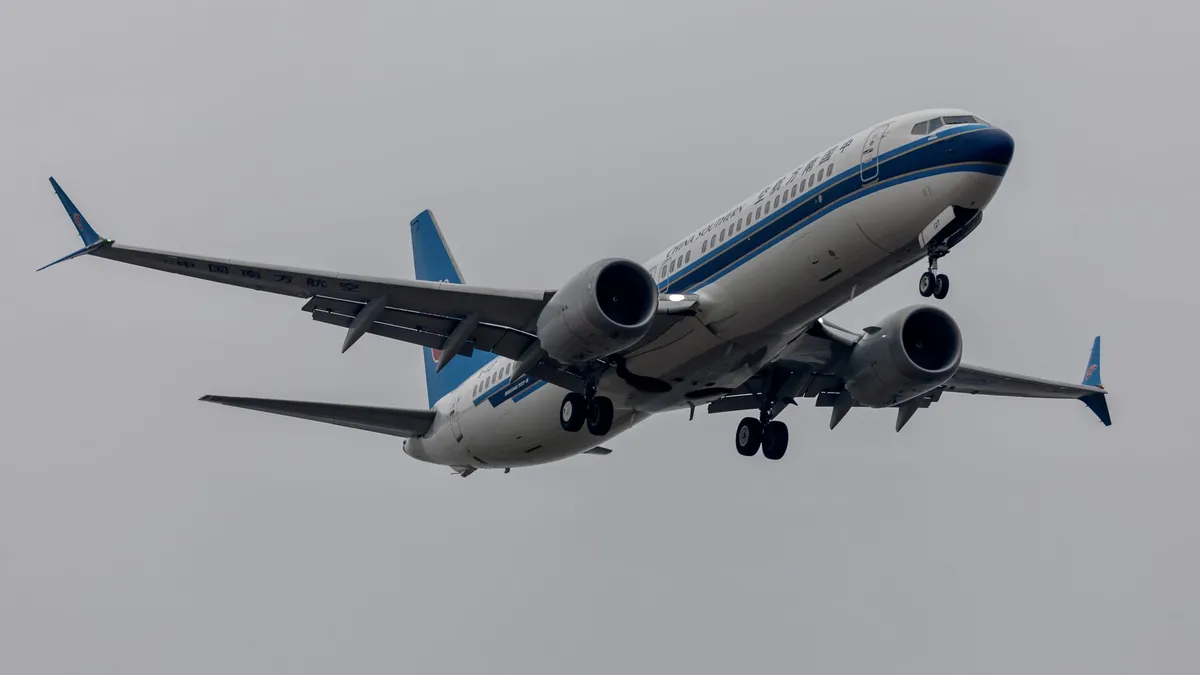
A Boeing jet, originally intended for delivery to a Chinese airline, was observed returning to the United States on Friday, according to flight tracking data. This development highlights the ongoing complexities surrounding the tariff war between Beijing and Washington, which has significantly impacted Boeing's operations. The flagship delivery plant located outside of Shanghai, China, has been caught in the crossfire of deteriorating trade relations between the two nations.
The return of this aircraft, which was among several jets awaiting final modifications before being handed over to a Chinese carrier, reflects the increasing disruptions in aircraft deliveries. This situation stems from a breakdown in the long-standing duty-free status that the aviation industry has enjoyed for decades. Prior to the announcement of tariffs by U.S. President Donald Trump on April 2, Boeing had sent three new 737 Max planes from its Seattle facility to Zhoushan in March. Another aircraft arrived last week, where Boeing is responsible for installing interiors and painting liveries before the final handover to customers, as reported by Flightradar24 data.
However, in a surprising turn of events, one of the initial jets scheduled for delivery departed from Zhoushan and flew to Guam—a common stopover on its way back to Seattle—indicating a reversal in its delivery status. Boeing has chosen not to comment on this situation.
The return of the jet to Boeing's main factory comes at a time when the company’s operations in China are facing heightened scrutiny due to the ongoing tariff dispute. Bloomberg News recently reported that Boeing is potentially facing a ban on imports in China, which is part of the escalating tensions resulting from Trump's global tariffs. Although there has been no official response from Beijing or Chinese state media, senior sources within the aviation and aerospace sectors have not been informed of any formal directives against the acceptance of Boeing planes.
Despite the absence of an official ban, analysts and industry insiders agree that the imposition of tariffs on U.S. goods by China in retaliation for Trump's actions would effectively hinder aircraft imports without a formal announcement. One senior source in the industry mentioned that Boeing and its suppliers are currently operating under the assumption that they will not be able to deliver planes to China in the immediate future.
Photos shared on plane-spotting websites earlier this year revealed that the returned aircraft was adorned with a livery for Xiamen Airlines, which is primarily owned by China Southern 600029.SS. Expectations were that this aircraft would eventually be delivered to Xiamen, although the airline did not respond to requests for comments. Notably, aviation publication The Air Current reported that one unnamed Chinese airline had withdrawn from a commitment to lease a Boeing aircraft. This return flight occurred despite discussions about the possibility of storing undelivered jets in bonded facilities to avoid tariffs.
Chinese customs have not provided any comments regarding these developments. The complexities introduced by the tariff war and the apparent reversal in aircraft deliveries come as Boeing is attempting to recover from a near five-year freeze on 737 Max imports, as well as previous trade tensions. The completion plant in Zhoushan, which Boeing opened in 2018, was established during a previous period of trade disputes under Trump's first presidency.
Although Boeing has not begun assembling complete airplanes in China, analysts believe that establishing a presence in this massive air travel market is crucial for the company’s long-term success. Recent reports indicate that Beijing has instructed Chinese carriers to halt purchases of parts manufactured in the U.S., which are essential for all modern commercial jets. However, two U.S. industry sources reported that they have not received any clear directives against shipping parts to China. A separate source operating a maintenance and repair facility in China stated they faced no issues importing American components. China's foreign ministry has also refrained from commenting on the matter, directing inquiries to relevant authorities.
Analysts suggest that the uncertainty surrounding the evolving tariff situation could leave many aircraft deliveries in a state of limbo. As some airline executives have expressed intentions to defer aircraft deliveries rather than incur potential duties, the effect on Boeing could be significant. Historically, one-quarter of Boeing's deliveries were destined for China, but this figure has been declining due to previous tensions, the 737 Max safety crisis, and the impacts of the COVID-19 pandemic. Boeing's data reveals 130 unfilled orders for Chinese airlines and lessors, with a substantial portion of over 760 unfilled orders for which Boeing has yet to identify a buyer likely aimed at China. Analysts predict that a temporary halt in deliveries to China would not immediately jeopardize Boeing’s overall business, as the company could pivot to serve other airlines, especially considering Airbus's limited capacity to absorb new orders.